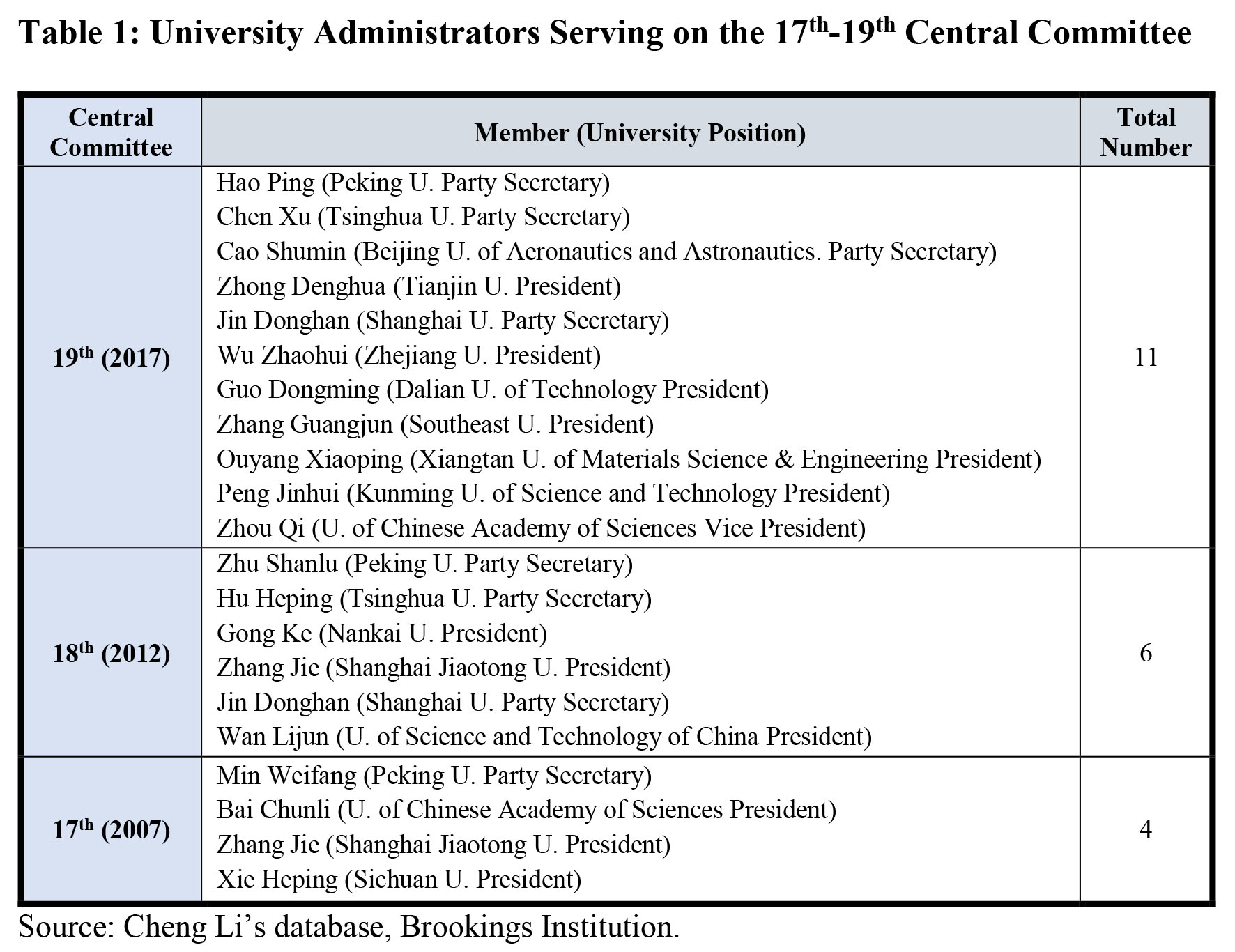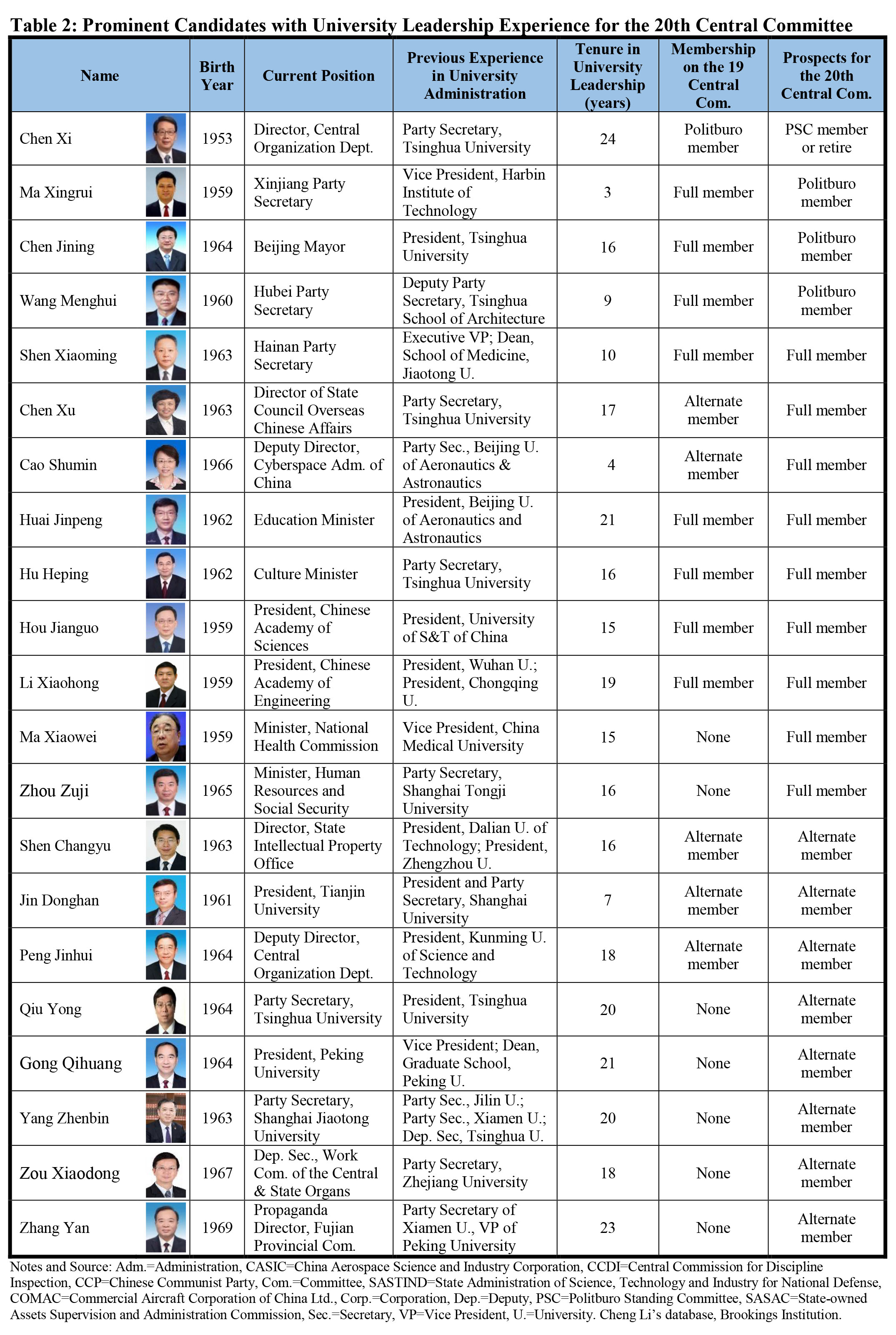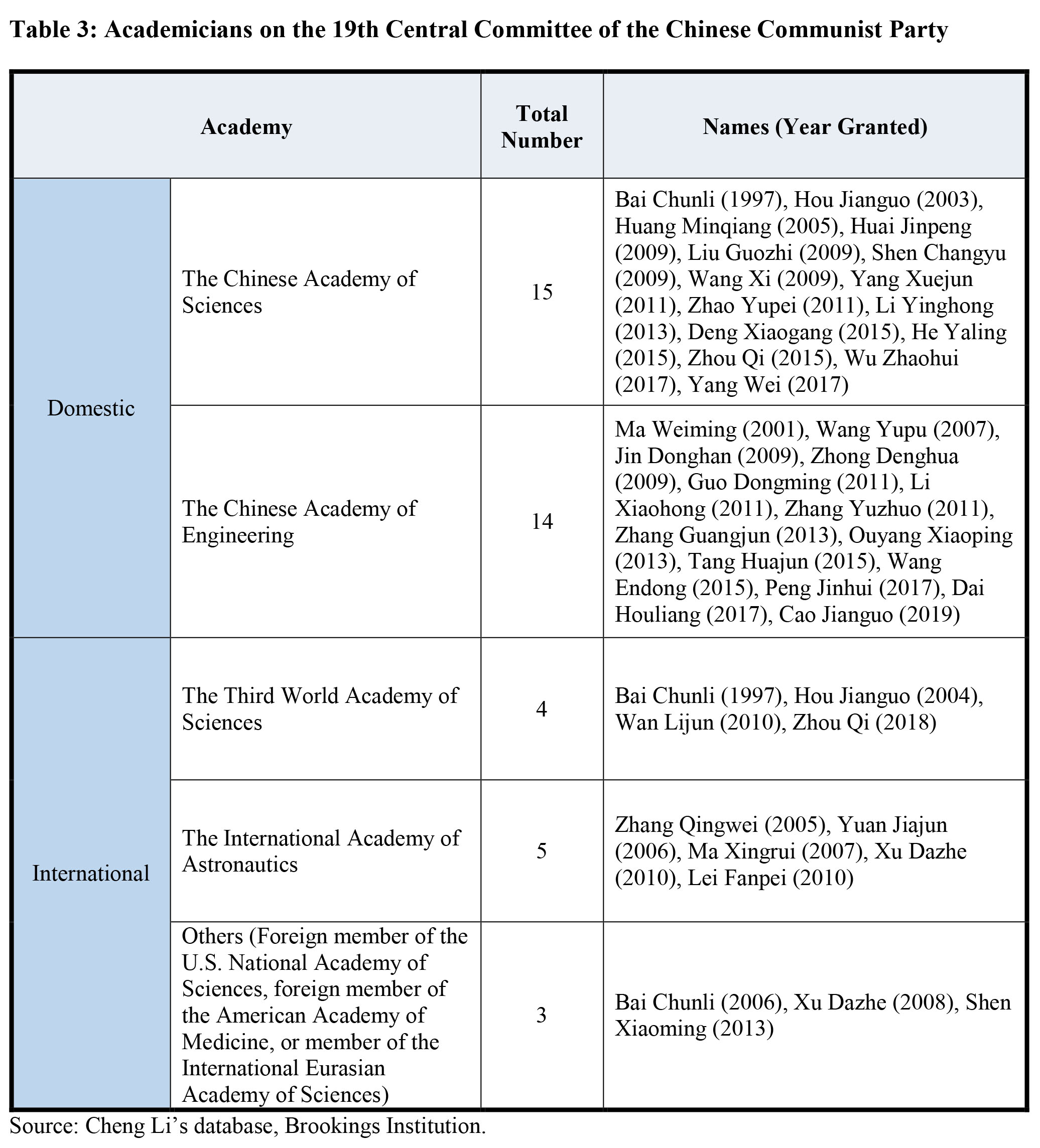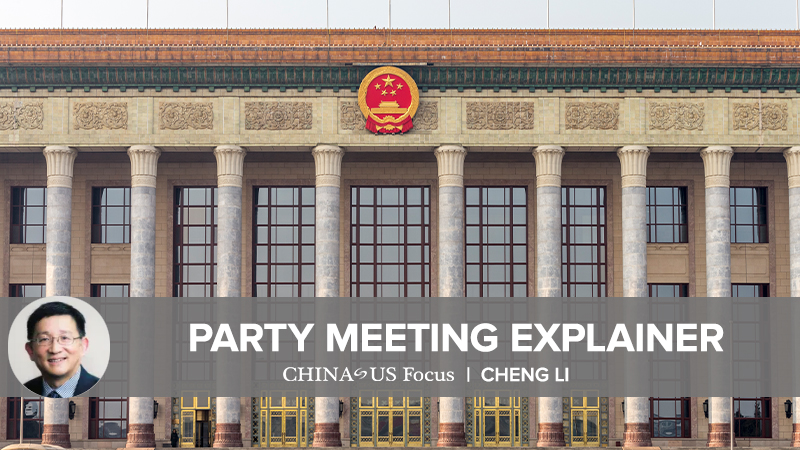For students of Pekingology, the transfer of a protégé of a top leader –– or the appointment of the head of a prominent institution –– on the eve of the National Party Congress could be intriguingly indicative of the overall leadership line-up. In August, the unexpected appointments of the presidents of China’s two most prestigious universities deserve much attention.
The first appointment was of Lin Shangli (1963), a political scientist and former student of Politburo Standing Committee (PSC) Member Wang Huning (1955), who was transferred from his prior position as deputy director and secretary general of the Central Policy Research Office of the Chinese Communist Party (CCP) to become president of Renmin University. Lin received his Bachelor’s, Master’s, and doctoral degrees in international relations from Fudan University, where he studied directly under then Professor Wang Huning for over a decade. An accomplished scholar in the field of Party-building and comparative politics, Lin served as vice president of Fudan University for many years before being promoted a few years ago to deputy director of the Central Policy Research Office, the position that Wang used to hold. Also surprisingly, Lin did not make it onto the delegate list for the 20th Party Congress this October. Lin’s future career will largely be centered on university leadership and academic research rather than on the Party apparatus.
The second personnel change was the transfer of Chen Yulu (1966), an economist who has long been working with Premier Li Keqiang, from his prior position as the highest-ranking vice governor of the People’s Bank of China to become president of Nankai University. Chen received his Bachelor’s, Master’s, and doctoral degrees in economics from Renmin University, where he later also served as professor of finance, dean of the School of Finance, and president of the university (2011-2015). After serving as vice governor of the People’s Bank of China for seven years (2015-2022), Chen has now returned to a university leadership position. Chen is a delegate to the 20th Party Congress, and he may even be able to obtain an alternate membership on the new Central Committee (CC). But he is unlikely to play a key role on the financial leadership team during Xi Jinping’s third term.
The cases of Lin and Chen should not be interpreted to mean that university administrators-turned-officials now face more difficulties in receiving promotions within the Party and government leadership than before. On the contrary, their representation on the CC and other national leadership bodies has significantly increased over the past decade. Serving as a Party secretary or president of China’s top universities is increasingly seen as a new channel for promotion to high office in the country during the Xi era.
The growing representation of university administrators under Xi
The presence of university administrators (Party secretaries and presidents) on the CCP Central Committee is certainly not new in post-Deng China. Former President of Fudan University Xie Xide (1921-2000), a distinguished physicist who received a master’s degree from Smith College and a doctoral degree from MIT, served as a full member on the CC for a decade (from 1982-1992 on the 12th and 13th CCs). She had taught at Fudan University since 1952 and joined the CCP in 1956. She served as vice president (1978-1983) and then president (1983-1988) of Fudan University and hosted U.S. President Ronald Reagan’s remarkable visit to Fudan in 1984.
In the earlier years of the People’s Republic of China (PRC), Jiang Nanxiang (1913-1988), a revolutionary leader of the Communist movement who later served as president (1952-1966) and Party secretary (1956-1966) of Tsinghua University, was an alternate member of the CC during his tenure as a top administrator at Tsinghua. But never have so many top university administrators served on this important Party leadership body as on the 19th CC formed in 2017. Table 1 shows the increase of representation of top leaders of civilian universities on the past three CCs, from four people on the 17th CC, to six people on the 18th CC, to 11 people on the 19th CC.

Peking University and Tsinghua University, China’s two “super universities,” have had representatives in the Party leadership over the past 15 years. In the case of 17th Party Congress, then Tsinghua Party Secretary Chen Xi was reelected as a member of the 17th Central Commission for Discipline Inspection (CCDI). Except for these two “super universities,” the selection of members to the CC seemed to have more to do with the backgrounds of individual leaders than the prestige of the institutions they represented.
Prominent candidates with university leadership experience for the 20th CC
Some of these CC members who advanced their careers from university administration later moved to other important leadership positions. Table 2 presents 21 prominent candidates with university leadership experience for the 20th CC. Sixteen of them (76 percent) have had tenures of more than 15 years in university leadership, and six of them have had more than 20 years of experience in university administration.

Many of them (14) currently serve as full or alternate members on the 19th CC. Only Politburo Member Chen Xi (1953) currently serves as director of the powerful CCP Central Organization Department (COD), which oversees the Party nomenklatura system. He may either move on to become a member of the PSC or step down from the Party leadership this fall. Three leaders, Xinjiang Party Secretary Ma Xingrui (1959), who previously served as Harbin Institute of Technology vice president; Beijing Mayor Chen Jining (1964), who previously served as Tsinghua University president; and Hubei Party Secretary Wang Menghui (1960), who previously served as Tsinghua School of Architecture deputy Party secretary, are among the leading candidates for the next Politburo.
The following nine leaders in Table 2 hold the rank of full minister and provincial chief (shengbu ji). They will all likely obtain full membership on the 20th CC this fall. Shen Xiaoming (1963), Chen Xu (1963), and Cao Shumin (1966) may be further promoted in the years to come. Three current alternate members, State Intellectual Property Office Director Shen Changyu (1963), Tianjin University President Jin Donghan (1961), and COD Deputy Director Peng Jinhui (1964) will likely retain their seats on the next CC.
Notably, several alternate members of the 19th CC with strong backgrounds in university administration do not appear on the delegation lists for the 20th Party Congress, and thus they will not return to this leadership body. They include Peking University Party Secretary Hao Ping (1959); Zhejiang University President Wu Zhaohui (1966); Dalian University of Technology President Guo Dongming (1959); Science and Technology Vice Minister Zhang Guangjun, (1965), who previously served as Southeast University president; Education Vice Minister Zhong Denghua (1963), who previously served as Tianjin University president; and Vice President of the Chinese Academy of Sciences Zhou Qi (1970). Zhou is one of the two youngest members of the 19th CC who were born in the 1970s.
One can expect that several current university administrators or leaders with strong backgrounds in this area will obtain alternate memberships as first timers on the 20th CC. Leading candidates include newly appointed Tsinghua Party Secretary Qiu Yong (1964), newly appointed Peking University President Gong Qihuang (1964), and Shanghai Jiaotong University Party Secretary Yang Zhenbin (1963).
Two leaders who have largely advanced their careers in university administration are now considered rising stars in the Chinese ministerial and provincial levels of leadership. Deputy Secretary of the Work Committee of the Central and State Organs Zou Xiaodong (1967) previously served as deputy Party secretary and Party secretary of Zhejiang University for almost a decade. Director of the Propaganda Department of the Fujian Provincial Party Committee Zhang Yan (1969) served as deputy Party secretary of Peking University in 2003 at the age of 34. After serving in that position for 11 years (and concurrently as vice president of Peking University), he was transferred to Xiamen University, where he served as Party secretary from 2014-2021. Zou and Zhang will play more important leadership roles (in or out of higher education) in the years to come.
The growing representation of university administrators on the CC and other important leadership bodies in recent years should be attributed at least partially to the role of Chen Xi. Perhaps no one has provided more direct assistance to Xi in that regard than Chen Xi, who served as executive deputy director of the COD in Xi’s first term and concurrently as director of the COD and president of the Central Party School, the top training place for Party officials, during Xi’s second term.
Xi Jinping and Chen Xi were classmates and roommates at Tsinghua University from 1975 to 1979, when they were both worker-peasant-soldier students in the Department of Chemical Engineering. Chen Xi was born in Putian County near Fuzhou City, in September 1953, making him three months younger than Xi. In college both Xi and Chen were sports fans, and they were also both interested in politics and world affairs. According to some unverified sources, on Xi’s recommendation, Chen Xi joined the CCP at Tsinghua a few months before graduating in 1978. After receiving a master’s degree in chemical engineering from Tsinghua, Chen Xi advanced his career mainly through Tsinghua, where he worked as an administrator for 24 years.
Xi and Chen maintained close personal ties during these years. When Xi served as a municipal and provincial leader in Chen’s hometown of Fuzhou from 1990 to 2002, Chen Xi always spent a great deal of time with Xi Jinping when visiting his parents at home. Not surprisingly, soon after Xi became the top leader of the CCP, Chen was made executive deputy director of the COD, essentially becoming Xi’s “chief personnel officer” and shaping the elite recruitment channel.
According to some Chinese journalists, Chen’s concerted efforts to promote university administrators to senior government positions not only reflect the age-old Confucian view that the “person who excels in study can pursue an official career” but also heralded a new normal for elite recruitment among distinguished scholars and university administrators (Xinmin Weekly, no. 11, 2015). But perhaps more importantly, these new appointments show that, as in the Jiang Zemin and Hu Jintao administrations, the powerful COD, now led by Xi’s confidant Chen Xi, has forcefully consolidated and broadened the secretary general’s powerbase.
Top scientists in the Party leadership
Without a doubt, political loyalty is the most important consideration for the promotion of these university administrators. But this should not undermine the fact that many of them are also top scientists and technical experts in their professional fields. As some China watchers recently observed, Xi Jinping “has made the current Central Committee the most educated one in the Party’s history.” According to a recent report by the Paulson Institute, 28 percent of the full members of the 19th CC hold doctorates, and most of them are in the science, technology, engineering, and math (STEM) fields. The report further shows “17 out of 30 top provincial promotions in Xi’s second term going to cadres with STEM backgrounds, compared with six out of a total 23 during his first term.”
Tsinghua University political scientist Yang Zhusong and his colleagues recently conducted large-scale quantitative research on Chinese provincial leaders. They found that, in terms of academic specialties, more of the newly promoted leaders after the 18th Party Congress have been scientists instead of engineers by training.
My research on both the provincial and national leadership in the Xi era yields similar findings to the aforementioned studies. This is particularly evident in the prestigious academic titles and memberships among the current CC members with strong backgrounds in university administration and scientific research.
Table 3 lists members of the 19th CC with the titles of academicians (yuanshi). Altogether 15 members (full or alternate) of the 19th CC hold the title of academician of the Chinese Academy of Sciences, including Education Minister Huai Jinpeng (1962) and China’s leading designer of warplanes and Vice President of the Aviation Industry Corporation of China Yang Wei (1963). Another 14 members are academicians of the Chinese Academy of Engineering, including Science and Technology Vice Minister Zhang Guangjun and China’s leading expert in computer science and Director of the State Key Laboratory of High Performance Server and Storage Technology Wang Endong (1966).

Table 3 also shows members of the 19th CC with the title of academician in prestigious international or foreign academies. For instance, Chinese Academy of Sciences President Hou Jianguo (1959), an expert on nanomaterials, and Chair of the All-China Federation of Returned Overseas Chinese Wan Lijun (1957), an expert on electrochemistry, both hold the prestigious title of academician on the Third World Academy of Sciences. Both previously served as president of the University of Science and Technology of China.
Five current CC members who advanced their professional careers from the aerospace industry are academicians of the International Academy of Astronautics (IAA). They include three prominent candidates for the next Politburo: Xinjiang Party Secretary Ma Xingrui, Hunan Party Secretary Zhang Qingwei (1961), and Zhejiang Party Secretary Yuan Jiajun (1962). IAA is a non-governmental international academic organization initiated by the world-renowned scientist and “aerodynamics master” Theodore von Karman. It was established in Stockholm in 1960 and headquartered in Paris. An earlier article in this series provided detailed discussion of these three prominent leaders’ decade-long experience as rocket scientists and commanders of China’s space programs. Their membership on the IAA reflects their strong professional credentials.
Three current CC members serve as foreign members of esteemed academies in the United States and Europe. For example, former President of the Chinese Academy of Sciences and internationally renowned nanotechnology expert Bai Chunli (1953) has been elected as an academician in the American Academy of Sciences (2006), Royal Danish Academy of Arts and Sciences (2007), the British Royal Society (2014), the American Academy of Arts and Sciences (2016), and the Belarusian Academy of Sciences (2017). Hainan Party Secretary Shen Xiaoming, a leading expert on developmental and behavioral pediatrics in China, previously served as executive vice president and dean of the School of Medicine at Jiaotong University in Shanghai. Shen was elected to be foreign member of the American Academy of Medicine in 2013.
The presence of these impressive scientists and university administrators on the CC, and especially their growing representation under Xi’s leadership over the past decade, reveals Beijing’s objective to accelerate technological innovation and scientific research in its drive to compete with the United States and other advanced global science and technology powers. China has greatly benefited from the international educational exchanges of the reform era – the formative years of these leaders. The next article in the series will focus on the status and implications of foreign-educated returnees in political leadership on the eve of the 20th Party Congress.
